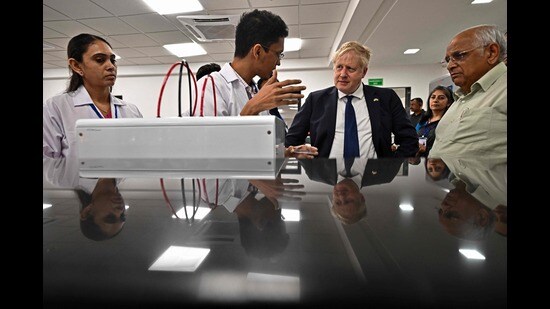India-UK: Time is ripe to craft a new legacy
When both sides are approaching the relationship afresh, this moment is ideal for cementing a strategic logic that can envelop the niggling irritants and take the conversation beyond the Commonwealth, curry, and cricket
Covid-19 seems to have a particular jinx on United Kingdom (UK) Prime Minister (PM) Boris Johnson’s visit to India. It put paid to two trips last year, and has again locked him in a serious controversy at home even before his current visit to India. The delay, however, has only deepened the geopolitical significance of the visit. In addition to reformulating the bilateral relationship post-Brexit, the two countries will also have to find common ground in the strategic jostling triggered on the global chessboard by the Ukraine conflict.

While Ukraine will undoubtedly figure significantly in the bilateral discussions, it would be incorrect to regard the visit as one more diplomatic push from the West to influence India. No doubt Johnson will say his piece on this; his pre-visit remarks that “it is vital that democracies and friends stick together” indicate as much. Undoubtedly, he will be effectively answered in terms of India’s self-interest and strategic autonomy, as foreign secretary Liz Truss was on her recent visit to India.
But the focus of the visit will squarely be on bilateral relations, and the larger picture is encouraging. Post-Brexit, the United Kingdom (UK) has made no secret of its desire to transform its ties with India; a successful India outreach would be the best advertisement for a Global Britain, unshackled from the European Union. An ambitious Roadmap 2030 was launched last May after the relationship, often hobbled by legacy issues, was elevated to a Comprehensive Strategic Partnership. It is logical that the current visit too would focus attention on at least four areas, broadly reflecting agreed priorities.
Prime among these would be trade and investment. Presently pegged at $25 billion, trade is targeted to double by 2030. The Free Trade Agreement (FTA) negotiations have progressed well in the two rounds held this year; a third round is scheduled from April 25 to May 6. The summit could fast-track these negotiations towards an early harvest deal. India’s recent efficiency in concluding FTAs and the UK’s keenness to expand markets beyond Europe bode well for the prospects. The UK is also expected to announce fresh investments, particularly in infrastructure and green energy projects. For its part, India remains the second-largest foreign investor in the UK and the second-largest job creator; 850 UK-based Indian companies employ 116,000 persons.
Second, the UK has shown keenness to upgrade its defence and security relationship with India. Two factors have contributed to this: One, the impressive growth in India-US defence ties and trade, including the conclusion of foundational agreements, and second, the realisation, post- Ukraine, that conditions need to be created to reduce India’s defence dependence on Russia. To that end, the UK has indicated a willingness to participate in Atmanirbhar Bharat and Make in India programmes.
Closer defence and maritime security cooperation with India also segue into the much-publicised “Indo-Pacific tilt” set out in the UK’s Integrated Review published last year. The most visible demonstration of India’s key role in the UK’s strategic foray into the Indo-Pacific was the visit of the new aircraft carrier, HMS Queen Elizabeth, as the spearhead of the Carrier Strike Group to Mumbai last year and the holding of complicated tri-services exercises with India. The UK’s decisions to join India’s Indo-Pacific Oceans Initiative (IPOI) and to be the co-leader of the maritime security pillar are also early signs of a growing strategic convergence. China predictably will remain a significant factor in creating a closer bonding; currently, the challenges posed by an authoritarian China to economic security, critical supply chains, and a rule-based order for trade and technology outweigh the economic blandishments that attracted the UK in recent years. Sanctions and counter-sanctions on the Uighur issue and China’s hardline on Hong Kong have sent relations plunging south.
The fourth area of focus is climate and clean energy. The two countries are already partners in the “Green Grids Initiative — “One Sun, One World One Grid” and the “Infrastructure for Resilient Island States” initiative; India has also joined the Glasgow Breakthrough Agenda that extends support to various green energy sectors. Several significant green financing initiatives, particularly the pledge from British Investment International to invest $1-billion in green projects over the next five years, and cooperation in offshore wind generation and electric vehicle manufacturing are other areas of promise.
Undeniably there are problems, and there are contradictions. The burden of colonial excesses, the pain of the Partition, the perceptions of a pro-Pakistan tilt, the extra oxygen in London’s atmosphere for anti-Indian elements, the meshing of India’s domestic matters with the UK’s domestic politics can all weigh heavily on the relationship.
The counter to all this is that India is a significant and familiar presence for the people of Britain. For the most part, there is great comfort in the relationship, and unmatched instinctive understanding. When both sides are approaching the relationship afresh, this moment is ideal for cementing a strategic logic that can envelop the niggling irritants and take the conversation beyond the Commonwealth, curry, and cricket.
Navtej Sarna is a former high commissioner of India to the UK, and ambassador to the US
The views expressed are personal
All Access.
One Subscription.
Get 360° coverage—from daily headlines
to 100 year archives.



HT App & Website







